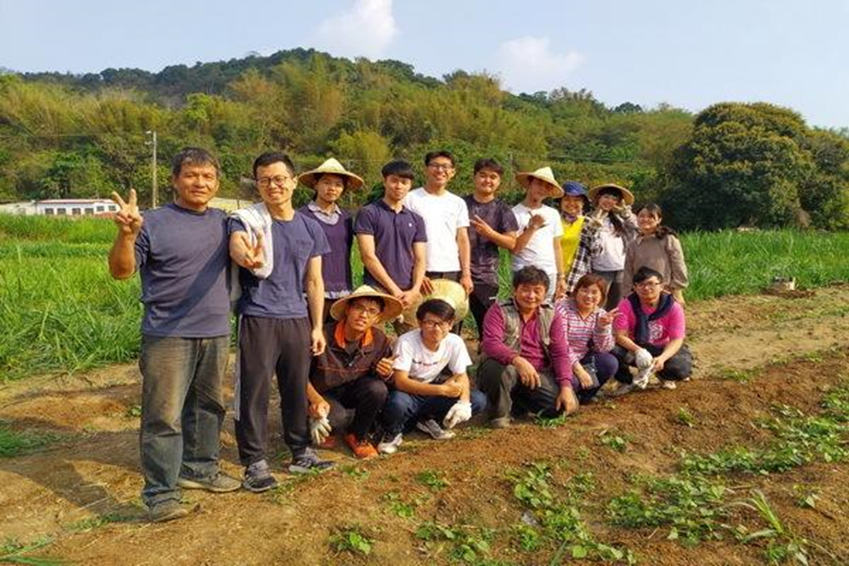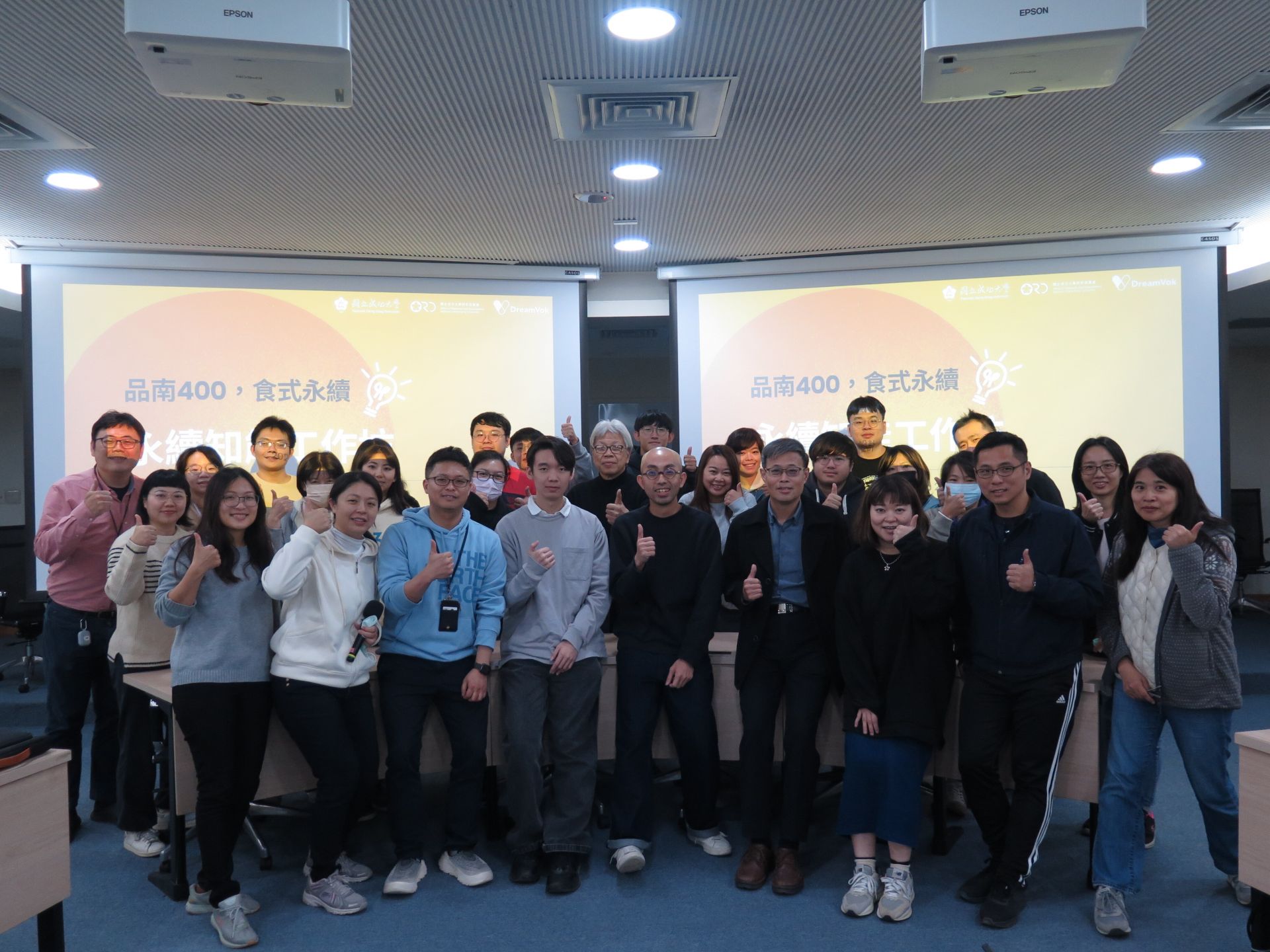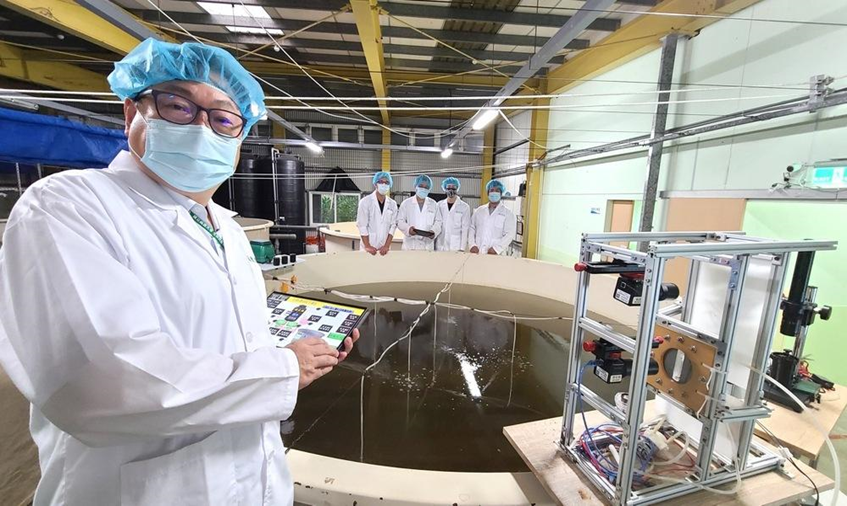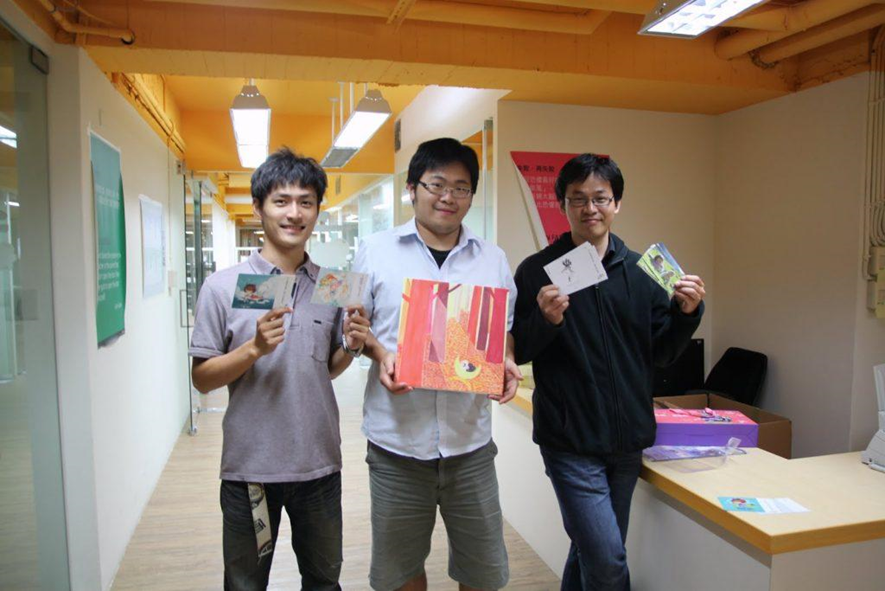SDG2
The Course ”Social Innovation Practice of Stoyama” from NCKU Department of Chinese Literature Strives for Food Education
【”On the Mountain and by the Sea-program and Practice” Steps Into Elementary School and Promotes Food Education】
“On the Mountain and by the Sea-program and Practice” is the general course which has been offered by the director of National Cheng Kung University (NCKU) Department of Chinese Literature (CL), Chao-Cheng Lin, since 2015. The initial purpose of the course is to concern the drainage basin of Zeng Wenxi river, and to follow the Satoyama Initiative. The Satoyama Initiative is a global effort to realize "societies in harmony with nature" through landscape approaches to biodiversity conservation and human well-being. The establishment of the course also expects to reach the development model of balance between lives, production, and nature through promoting environmentally friendly.
After the curriculum, Mr. Lin recognized that it is more difficult to develop residents’ awareness to participate in river protection. Therefore, the course turns to promote sustainable agriculture at the towns nearby the river. It is fully aware that the usage of pesticide and synthetic fertilizers during the process of production in agriculture pollutes the river; however, there is no stringent verification. The course expects to care about nature in the aspect of industry, and the main goal is to step into satoyama, find the problems, think of the solutions, and practice for the Zeng Wenxi river, and achieve the vision through sustainable agriculture. The course consists of two topics, food education and industrial restructure, and students are divided into two groups, food education and industry teams.
The curriculum design of food education in the beginning is to connect the consumers and place of origin. Thus, Mr. Lin arranged the “Trip to the place of food origin” with the aim of influencing adults to be aware of the importance of sustainable agriculture through children; afterwards, the main goal of the course became enabling children to understand nature and what they eat, and encouraging them to DIY with five senses. Jia-rong Lee, the course manager mentioned that children are able to keep the skill once they experience themselves even though it seems that the content of the DIY is too simple to be taught, it is the most effective teaching method in this phase. The content of food education includes butterfly pea experiment, plate with six categories of nutrients, usage of cookers, peeling off sweet potatoes and water caltrop, etc. Besides, elementary school students can observe the vegetables and fruits, and taste the flavor after the ingredients are cooked.
The industrial transformation expects that the farmers can start to reduce the usage of pesticide, and cultivate in eco-friendly ways. Therefore, the course cooperates with the farmers in Yujing District. Nevertheless, it is hard to conduct industrial transformation for the Irwin mango which Yujing is celebrated for. Since plant disease will be severe without pesticide, the harvest will be pessimistic for 3 years if the transformation is conducted. As a result, the team invited the former project manager of Earth Friend in Guantian District to be the advisor. The team committed to promote the strap-shaped transformation for sustainable agriculture, and enable students to conduct field research in the district, and help discover marketing programs.
【The Course “Social Innovation Practice of Stoyama” from NCKU Department of Chinese Literature Onwards to Yujung】 Is it possible to block the fruit flies from mangoes with high economic value, and create a three-win situation for producers, consumers, and nature? The Course “Social Innovation Practice of Stoyama” held by Chao-Cheng Lin, the professor from NCKU CL, led 12 students from various departments to Yujing, and planted 11 cultivars of mangoes. They planned to turn Irwin Mango into an environmentally friendly cultivar (Da-Shu Mango), grow healthy mango trees instead of bagging and pesticide, and build a “Formosan sambar mango” brand.
The course invited teachers from various professional fields to teach students' hands-on practices. Prof. Lin indicated that the course has recognized that it requires 20 times of pesticide spraying to achieve the Yujing mangoes with perfect shapes, which damages the environment, producers, and consumers severely, and even owns potential to pollute the upstream of Zenf Wenxi river, from conducting field research in Yujing since they concerned the drainage basin of Zeng Wenxi river. From ideating, practicing, and contacting the Zhuwei Community located in Yujing District to ensure their willingness of providing experimental fields, 12 students from NCKU planted 12 mango trees with 11 cultivars on March 15th, 2020.
Mango is an important product in Yujing, Jian-Xiong Huang and Chun-Min Chen, the lecturers of the course, mentioned that if the experiment proves that Da-Shu Mango is able to solve the hazard from fruit flies efficiently, the usage of pesticide and baggings can be dramatically decreased, and can therefore reduce expenses for hiring works; thus, more farmers may be convinced to plant Da-Shu mangoes.
Jian-Xiong Huang and Chun-Min Chen have assisted NCKU in the establishment of ecological education park “Mango Green Land” in Dong-Ning Campus. Mango trees, which are Da-Shu Mangoes, in Mango Green Land are not artificially dwarfed, and the fruitful trees are without the damage from fruit flies. Mr. Huang analyzed that there are two reasons for the result: first, the healthy habitat enables the mangoes to grow thick pericarp and Tannins, and thus the fruit flies can not easily harm the fruits. Second, the location of fruits is too high for the flies to reach.
Trees in the city are commonly planted with baum pots; however, trees are not able to stick roots with such a narrow space. As a result, trees dump easily during typhoon days. Even though Mango Green Land is located in the city center, Mr. Huang indicated that by “deep dig, shallow plant, in-hillock growth”, the healthy radial roots grow, which are able to resist natural disasters and pests. A healthy mango can produce fruits with nice flavor.
Hai-Long Xu, the president of Zhuwei Community in Yujing District of Tainan and the owner of Tai-Lu Farm, pastures the Formosan sambars, and uses the defecation of the sambers as the organic fertilizer for the mango farm, which is a model of circular agriculture. Mr, Xu mentioned that he built the “Formosan sambar mago”, which is environmental friendly, with NCKU general course; besides, he expects to create the new cuisine “mango chicken soup” with Taijiang area, present the unique Taiwanese catering culture, and promote mango industry.
“On the Mountain and by the Sea-program and Practice” is the general course which has been offered by the director of National Cheng Kung University (NCKU) Department of Chinese Literature (CL), Chao-Cheng Lin, since 2015. The initial purpose of the course is to concern the drainage basin of Zeng Wenxi river, and to follow the Satoyama Initiative. The Satoyama Initiative is a global effort to realize "societies in harmony with nature" through landscape approaches to biodiversity conservation and human well-being. The establishment of the course also expects to reach the development model of balance between lives, production, and nature through promoting environmentally friendly.
After the curriculum, Mr. Lin recognized that it is more difficult to develop residents’ awareness to participate in river protection. Therefore, the course turns to promote sustainable agriculture at the towns nearby the river. It is fully aware that the usage of pesticide and synthetic fertilizers during the process of production in agriculture pollutes the river; however, there is no stringent verification. The course expects to care about nature in the aspect of industry, and the main goal is to step into satoyama, find the problems, think of the solutions, and practice for the Zeng Wenxi river, and achieve the vision through sustainable agriculture. The course consists of two topics, food education and industrial restructure, and students are divided into two groups, food education and industry teams.
The curriculum design of food education in the beginning is to connect the consumers and place of origin. Thus, Mr. Lin arranged the “Trip to the place of food origin” with the aim of influencing adults to be aware of the importance of sustainable agriculture through children; afterwards, the main goal of the course became enabling children to understand nature and what they eat, and encouraging them to DIY with five senses. Jia-rong Lee, the course manager mentioned that children are able to keep the skill once they experience themselves even though it seems that the content of the DIY is too simple to be taught, it is the most effective teaching method in this phase. The content of food education includes butterfly pea experiment, plate with six categories of nutrients, usage of cookers, peeling off sweet potatoes and water caltrop, etc. Besides, elementary school students can observe the vegetables and fruits, and taste the flavor after the ingredients are cooked.
The industrial transformation expects that the farmers can start to reduce the usage of pesticide, and cultivate in eco-friendly ways. Therefore, the course cooperates with the farmers in Yujing District. Nevertheless, it is hard to conduct industrial transformation for the Irwin mango which Yujing is celebrated for. Since plant disease will be severe without pesticide, the harvest will be pessimistic for 3 years if the transformation is conducted. As a result, the team invited the former project manager of Earth Friend in Guantian District to be the advisor. The team committed to promote the strap-shaped transformation for sustainable agriculture, and enable students to conduct field research in the district, and help discover marketing programs.
【The Course “Social Innovation Practice of Stoyama” from NCKU Department of Chinese Literature Onwards to Yujung】 Is it possible to block the fruit flies from mangoes with high economic value, and create a three-win situation for producers, consumers, and nature? The Course “Social Innovation Practice of Stoyama” held by Chao-Cheng Lin, the professor from NCKU CL, led 12 students from various departments to Yujing, and planted 11 cultivars of mangoes. They planned to turn Irwin Mango into an environmentally friendly cultivar (Da-Shu Mango), grow healthy mango trees instead of bagging and pesticide, and build a “Formosan sambar mango” brand.
The course invited teachers from various professional fields to teach students' hands-on practices. Prof. Lin indicated that the course has recognized that it requires 20 times of pesticide spraying to achieve the Yujing mangoes with perfect shapes, which damages the environment, producers, and consumers severely, and even owns potential to pollute the upstream of Zenf Wenxi river, from conducting field research in Yujing since they concerned the drainage basin of Zeng Wenxi river. From ideating, practicing, and contacting the Zhuwei Community located in Yujing District to ensure their willingness of providing experimental fields, 12 students from NCKU planted 12 mango trees with 11 cultivars on March 15th, 2020.
Mango is an important product in Yujing, Jian-Xiong Huang and Chun-Min Chen, the lecturers of the course, mentioned that if the experiment proves that Da-Shu Mango is able to solve the hazard from fruit flies efficiently, the usage of pesticide and baggings can be dramatically decreased, and can therefore reduce expenses for hiring works; thus, more farmers may be convinced to plant Da-Shu mangoes.
Jian-Xiong Huang and Chun-Min Chen have assisted NCKU in the establishment of ecological education park “Mango Green Land” in Dong-Ning Campus. Mango trees, which are Da-Shu Mangoes, in Mango Green Land are not artificially dwarfed, and the fruitful trees are without the damage from fruit flies. Mr. Huang analyzed that there are two reasons for the result: first, the healthy habitat enables the mangoes to grow thick pericarp and Tannins, and thus the fruit flies can not easily harm the fruits. Second, the location of fruits is too high for the flies to reach.
Trees in the city are commonly planted with baum pots; however, trees are not able to stick roots with such a narrow space. As a result, trees dump easily during typhoon days. Even though Mango Green Land is located in the city center, Mr. Huang indicated that by “deep dig, shallow plant, in-hillock growth”, the healthy radial roots grow, which are able to resist natural disasters and pests. A healthy mango can produce fruits with nice flavor.
Hai-Long Xu, the president of Zhuwei Community in Yujing District of Tainan and the owner of Tai-Lu Farm, pastures the Formosan sambars, and uses the defecation of the sambers as the organic fertilizer for the mango farm, which is a model of circular agriculture. Mr, Xu mentioned that he built the “Formosan sambar mago”, which is environmental friendly, with NCKU general course; besides, he expects to create the new cuisine “mango chicken soup” with Taijiang area, present the unique Taiwanese catering culture, and promote mango industry.
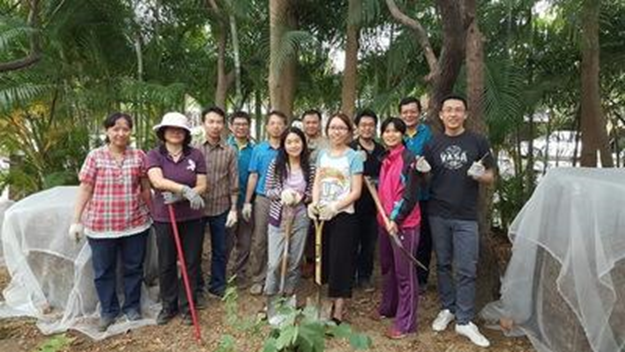
Social Innovation Practice of Stoyama.
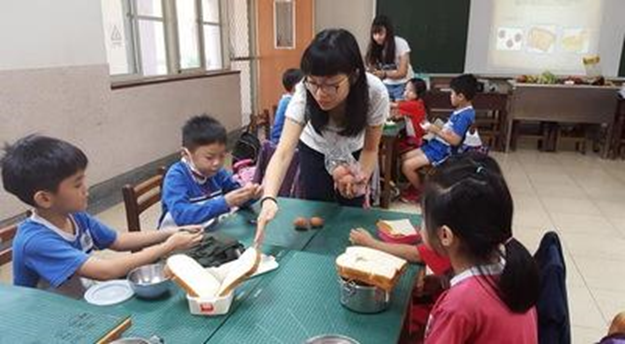
Steps Into Elementary School and Promotes Food Education.
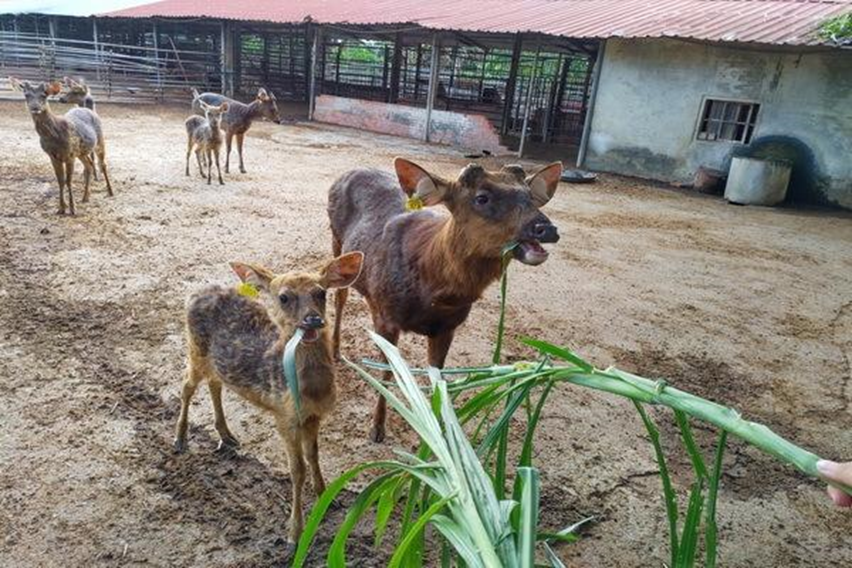
Students feed sambar in the ranch .
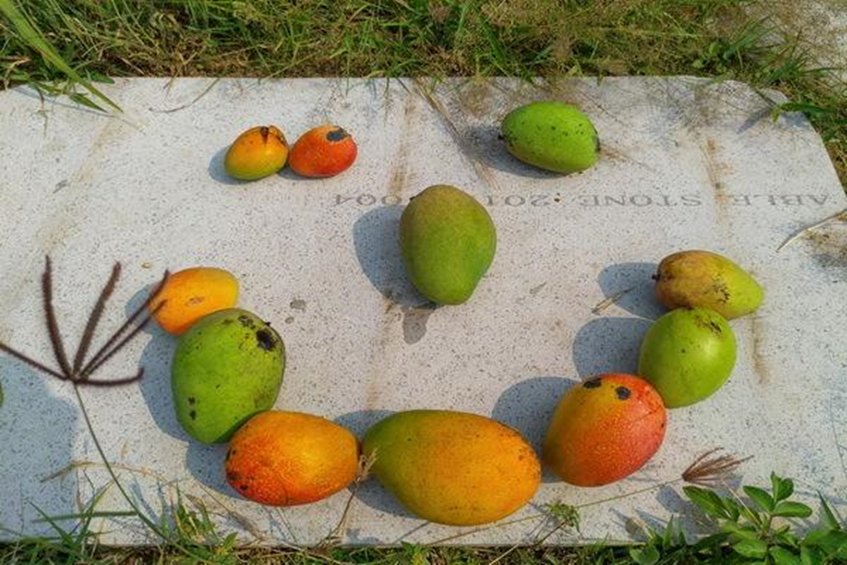
The thick mango peel is not easy to be bitten by mosquitoes.

